

Shop
The official shop for Walter M. Bortz II, MD.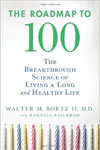 |
The Roadmap to 100: The Breakthrough Science of Living a Long and Healthy LifeWith a baby boomer turning sixty every ten seconds, we are rapidly becoming an aging society. However, cutting edge research on the connection between age and disease shows us that many of the preconceptions we had about how to grow old require a second look. The Roadmap to 100 is a groundbreaking book, full of take-away prescriptive advice, which nearly 75 million baby boomers in the United States and many more abroad will value. Top gerontologist and Stanford medical school professor Dr. Walter Bortz and co-author Randall Stickrod draw on new science and a 30-year longitudinal study of centenarians to show that:- Genetics plays a smaller role in aging than previously thought - Senility, dementia, and other diseases of the elderly, are largely preventable and not an inevitable consequence of aging - Engagement - through sexual relationships, social interaction, and professional activity - is a key factor in long, healthy lives - Physical fitness can recover at least 30 years of aging Filled with in-depth insight and practical advice, The Roadmap to 100 gives you the power to control your own destiny and live well beyond 100. More » |
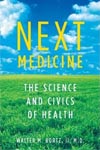 |
Next Medicine: The Science and Civics of HealthIn Next Medicine, Dr. Bortz shows how the defects of American healthcare threaten the stability of the nation. He argues that the financial interests of biotech and drug companies have eroded the values of the medical profession and placed profit before human well-being. More » |
 |
Occupy Medicine: A Call For A Revolution To Save American HealthcareIn Occupy Medicine: A Call For A Revolution To Save American Healthcare, Dr. Bortz shows how American medicine has morphed into a bureaucratic industrial complex whose defining core is the perpetuation of sickness. Occupy Medicine is a layman's guide through the convoluted labyrinth of our present medical system. More » |
 |
Living Longer for DummiesWhat's the average human life span...72 years...78 years? Actually, science has determined that humans were designed to live 120 years, and that, until now, most people died too soon. Itís also now clear that most of the maladies we commonly associate with aging, such as frailty, senility, and arthritis arenít part of natureís plan, but the result of other factors such as bad nutrition, disease ,and disuse. Best of all is the news that, no matter how old you are or what shape youíre in, you can take steps to reverse the aging process that has already occurred in you and to slow your rate of aging in the future. Living Longer for Dummies » |
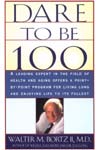 |
Dare to be 100In 1995 the first of 75 million baby boomers turned fifty. We know this much. What we don't know is, beginning in 2045, how many of them will turn 100. Two principal credentials will have to be presented if most are to make it -- guts and smarts. Smarts is the accumulation and use of the cascade of new knowledge that provides the when, what, and how to aim for 100. Our current era is the first in which sufficient knowledge has been accumulated to provide sound answers to these basic questions concerning human life. Having smarts affects each part of your life -- the biological, psychological, and social. It affects you individually and collectively as a member of the larger community. It is one of the two basic ingredients of living to be 100. More » |
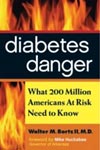 |
Diabetes DangerThis comprehensive book provides much-needed information on the horrifying dangers of uncontrolled diabetes. This is an essential guide for diabetics, their caregivers or anyone who has diabetes in their family. Diabetes Danger also provides crucial advice for those seeking to prevent a diabetes outbreak of epidemic proportions. Diabetes Danger offers hope, showing steps that should be taken to quench the fire of diabetes. He also gives potential strategies to reverse diabetesí symptoms once the dreaded disease has struck. Often, health maintenance rather than medical intervention is more effective in reining in this horrible disease. Introduced with a Foreword by Governor Mike Huckabee of Arkansas, author of the recent bestseller Quit Digging Your Grave with a Knife and Fork. More » |
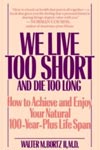 |
We Live Too Short and Die Too Long: How to Achieve and Enjoy Your Natural 120-Year-Life SpanOld age is the ultimate epidemic--there are now three million people in the United States over 85--and Bortz estimates that the potential life expectancy is 120 years. Although this sounds like tabloid sensationalism, Bortz's assertions are amply substantiated by the latest research and his own impressive credentials as a practicing physician and past president of the American Geriatric Society. Merely achieving a maximum lifespan is not the goal of this book, however; it is that old age can be good and its goodness depends on individual commitment to cultivating a healthy lifestyle. There is nothing revolutionary in this approach--sensible diet and continued physical and mental activity are prescribed--but the lively, authoritative style and references to scientific and literary sources make this a readable, informative addition to popular geriatrics collections. (Karen McNally Bensing, Benjamin Rose Inst. Lib., Cleveland. Copyright 1991 Reed Business Information, Inc.) More » |
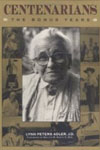 |
Centenarians: The Bonus YearsNumerous books have been written on the topic of old age; Adler's, however, highlights the past, present, and future lives of centenarians-the very eldest of our society. Her book, as well as her state and national efforts at increasing awareness of those 100 years of age and over, offers a blend of timely research supported with lively, true-life accounts from individual centenarians and family members. The chapters on historical recollection and present and future challenges show excellent organization coupled with expert professional knowledge and personal views of the centenarians. This is an enjoyable, economical book for older and younger readers alike who are interested in issues of longevity, quality of life, and meaning. An extensive resource agency listing even includes Willard Scott's address for centenarian recognition. (Linda Malone, Old Dominion Univ., Norfolk, Va. Copyright 1994 Reed Business Information, Inc.) More » |
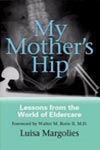 |
My Mother's HipSome 400,000 hip fractures occur every year, the vast majority among the elderly; all too often these fractures are associated with death or severe disability. After her mother's double hip fracture, Luisa Margolies immersed herself in identifying and coordinating the services and professionals needed to provide critical care for an elderly person. She soon realized that the American medical system is ill prepared to deal with the long-term care needs of our graying society. Forward by Walter M. Bortz II, M.D. More » |
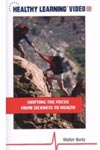 |
Shifting the Focus from Sickness to HealthThe medical-industrial complex spends 95% of our nationís $1.9 trillion dollar-per-year (4 billion dollars per day) health-care bill on disease. The current emphasis is totally on "curing" people; it should be on "functional" health. In Shifting the Focus from Sickness to Health, noted author, Runners World magazine science board member, and past president of the American Geriatrics Society Dr. Walter M. Bortz II, MD, details why and how the health-care focus should be on preventing health problems. Prevention is where true economic savings will occur. This covers why Americans seek health salvation in a pill bottle, instead of taking personal responsibility for health. Produced in cooperation with the American Council on Exercise. |
|
Home |
Dare to Be 100 |
News |
Longevity Library |
Calendar |
Q&A |
Contact Us |
Shop |
Video |
Links |
Site Map
|
Copyright 2006-2025 Walter M. Bortz II, M.D.